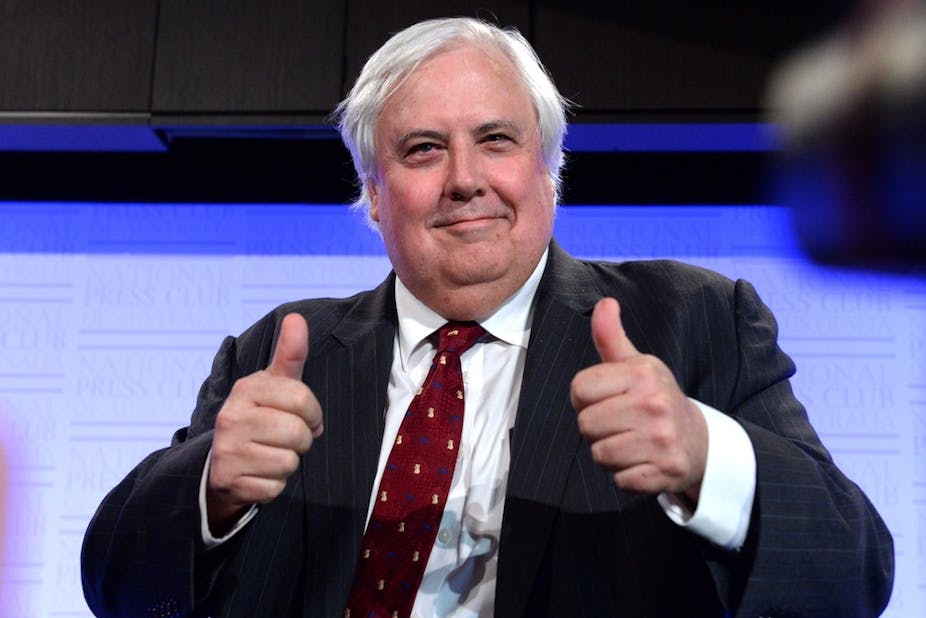The low income superannuation contribution is rapidly becoming a case study in the perils of linking unrelated policy initiatives.
The scheme, a federal government contribution of up to $500 to people earning less than $37,000 per year, was a response to the structural inequity of low income earners paying more tax on their superannuation contributions than higher income earners, thanks to the flat rate of tax applied to earnings.
As I have written previously the superannuation system is not a fair system. The LISC grants a tax concession without requiring additional contributions. This boosts retirement savings significantly without reducing take home pay.
But the Rudd/Gillard government’s decision to link it to revenue collected from the mining tax has made it become a political hot potato that has seen an unlikely saviour emerge: mining billionaire Clive Palmer.
When Labor introduced the mining tax, it hitched a package of spending measures to it, including the Low Income Superannuation Contribution (LISC). Both the mining tax and the LISC were based on recommendations of the Ken Henry tax review. While neither emerged from the parliamentary process in the form proposed by Henry, one of the biggest flaws was the act of linking it to revenue collected by the mining tax.
The scheme, introduced from 1 July 2012, effectively refunds the tax paid by the superannuation funds on compulsory contributions. This gives a tax break of 15%, comparable to that available to a person earning up to A$80,000 but still less than a person on the higher income tax brackets.
But its funding mechanism has given the Abbott Coalition a reason to abolish the scheme, even though it addresses the bias to high income earners in the superannuation system.
Enter Clive Palmer, who this week said that while he supported the repeal of the mining tax, he would not support the axing of several other funding initiatives, including the low income superannuation scheme.
The repeal of the initiative was opposed by the Senate Standing Committee on Economics, which stated in a report in December last year that: “Superannuation groups that provided evidence to the committee were broadly united in opposing the repeal of the LISC”.
These groups were particularly concerned that the repeal of the LISC would remove any concession low-income earners received on their superannuation contributions, as the 15% flat rate on superannuation contributions was higher than the rate they paid on their take-home income.
The Government introduced the MRRT Repeal Bill into Parliament last year, but it was rejected by the Senate in March this year.
The recommendations of the Committee were that the Bill be passed but that the issue of superannuation incentives for low income earners be revisited when the budget returns to surplus and as part of the proposed review of taxation. The ALP members tabled a dissenting report which highlighted the repeal of the LISC as a reason for the legislation not to proceed.
The Bill was reintroduced into the House of Representatives last month to be debated by the Senate after the incoming Senators took their seats on 1 July. Although not part of the 2014 budget, the repeal of the LISC is consistent with the current Government’s approach in cutting back expenditure. It was estimated to cost around $950 million per year, considerably less than the 2013 tax expenditure of $16 billion on employer contributions to superannuation.
This government, however, is focused on cutting expenditure to bring the budget into surplus and has deferred decisions about tax expenditures to the tax review.
Although the LISC is not a budget initiative, the abolition is yet another regressive impact on low income earners who will also be impacted by the proposals for the medical co-payment, the removal of the schoolkids bonus (which Palmer also says he won’t support), deregulation of university fees and restructuring of income support payments.
Ironically the Government is highlighting the inclusion of the Superannuation Guarantee in its Paid Parental Leave Scheme - yet the LISC benefits 2.1 million low paid women.
Clive Palmer has appeared to commit the Palmer United Party to oppose the repeal of the LISC. Under the current composition of the Senate a combination of the ALP, Greens and PUP senators have the numbers to block legislation. If PUP senators have the interests of low income Australians at heart, they must hold firm on this commitment.

